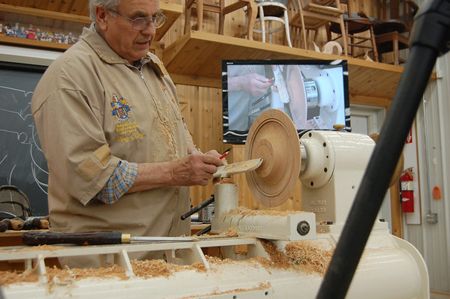
Ray Key teaching turning at Marc Adams School of Woodworking.
I just read a column in the Chicago Tribune, by staff reporter Ron Grossman, that describes Mr. Grossman’s experience at Marc Adams School of Woodworking. The writer, a novice wood turner, took a class with master turner Ray Key and wrote a wonderful piece about his ups and downs.
The column’s lead has all the hallmarks of great writing: informative, engaging, and poetic. You learn without feeling like you’ve opened a textbook chapter. Mr. Grossman writes: “When you screw up royally on a wood-turning lathe, any sentient being within earshot ducks. It’s an instinctive response to the sound of a piece of walnut or maple, under transformation into a bowl or vase, soaring into space, as if trying to return to the tree from which it came. Ditto, when centrifugal force slams a steel-cutting tool onto the cast-iron machine with a bang akin to an orchestra tuning up for Verdi’s ‘Anvil Chorus.'”
Grossman describes his one-on-one experience with Key, allowing us a glimpse into the master/apprentice relationship that used to be so common in the craft.
“At the first session, Key took inventory of the skills we brought to a lathe. Key began on a reassuring note, telling me: ‘You’ve got a lot of good, raw material.’ Then he got to the other side of the ledger: I held the tool wrong. My stance was off. I wasn’t following through properly. Many a golf or tennis pro has used similar words when critiquing a student’s footwork or grip on a racket or club.
My response was to return after class to the motel where I was staying and despairingly throw myself onto a bed. But the following day, my spirits were lifted by the realization that doing it Key’s way was a lot easier than my hack-and-slash method. That relaxed me enough to savor the opportunity of the class. … The thrill of a master class isn’t having the maestro look over your shoulder, but the reverse.”
Great stuff, and it brings back memories of a weeklong intensive class on hand tools I’d taken with Phil Lowe years back at the Center for Furniture Craftsmanship. I walked into the shop eager to learn, anxious for evaluation of my skills. That was followed by a bit of despair as I realized I’d not known as much as I thought I did. But by the end of the class, there was a sense of victory in that I was so much better with hand tools than I was just five days earlier–solid know-how that has helped me have more fun with the craft.





















Log in or create an account to post a comment.
Sign up Log in